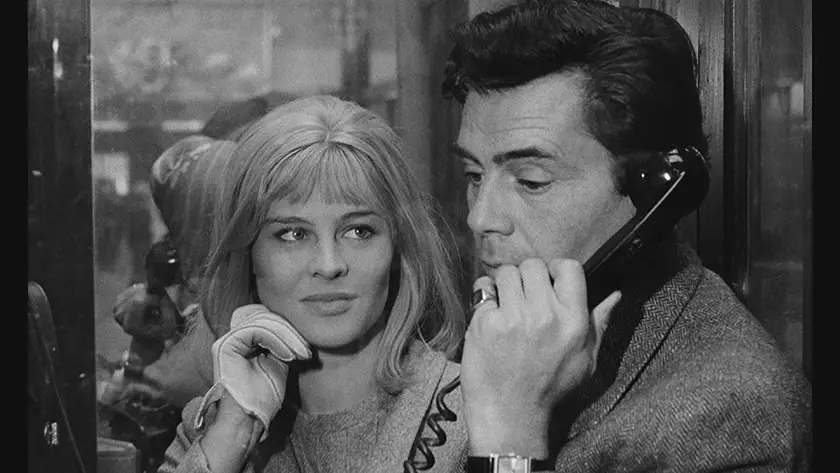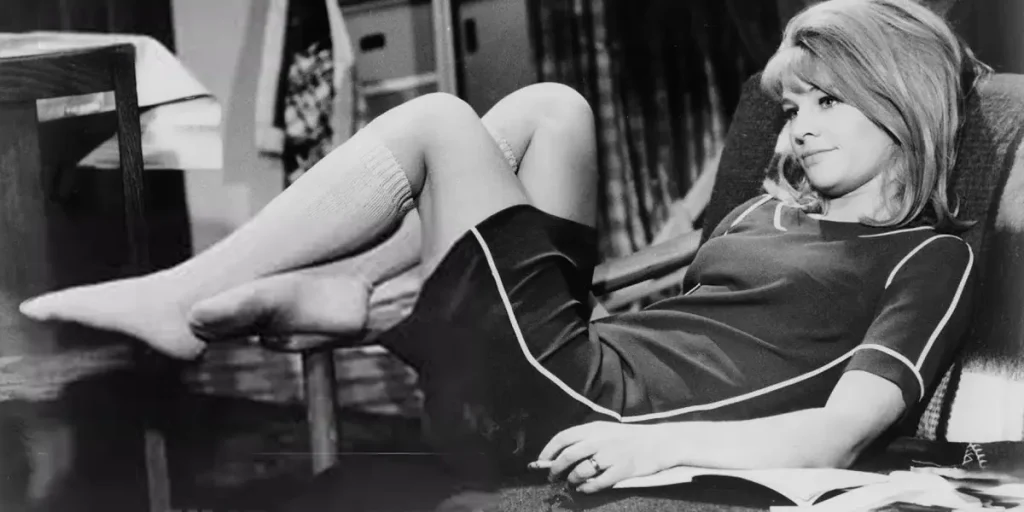John Schlesinger’s Darling is an interesting and surprisingly detailed product of its time that’s saved by Julie Christie’s brilliant performance.
Director: John Schlesinger
Genre: Drama, Romance
Run Time: 127′
Rated: TV-MA
Original Release: August 3, 1965
Re-Release: May 30, 2025 in U.K. cinemas; June 16, 2025 on 4K UHD and Blu-ray
Since it’s getting a 4K restoration by StudioCanal for its 60th anniversary, this is as good a time as any to write about Darling, the British classic that turned Julie Christie into a star. Despite it being a bit scandalous back in the day due to the mature subjects it tackles, though, nowadays Darling can seem a bit tame and even old-fashioned. Nevertheless, like any other film, Darling must be considered and evaluated on its own terms and as a product of its time, not through a contemporary, post-MeToo lens.
And in that sense, the movie still works as a story about the ambitions of a hungry and amoral young woman, and the emptiness that her actions ultimately bring to her life.
Julie Christie is undeniably magnetic as Diana Scott, a twenty-something woman living in Swinging London who still wants more despite having a decent career as a model and an apparently loving husband in Tony Bridges (Trevor Bowen). Thus, the film ends up being about how she sleeps with different men in order to improve her career opportunities, move in more interesting circles, and in general, fulfil her considerable ambitions, both artistic and sexual.
These men include Robert Gold (Dirk Bogarde), a literary interviewer and director of a television arts program, who abandons his family in order to move with her into a flat; Miles Brand (Laurence Harvey), an advertising executive who gets her a (supposedly) starring role in an exploitation movie; and Prince Cesare (José Luis de Villalonga), a widower who seduces Diana and eventually marries her, turning her into a British-Italian princess.

Taking into account Darling came out in the mid-sixties, it is commendable that it manages to tackle such subjects as female sexuality, homosexuality, infidelity and abortion, especially considering the way movies were censored and controlled in the previous decade. Of course, there is nothing too explicit in Darling (apart from Julie Christie’s rather gratuitous nude scene), but a lot is conveyed rather subtly, especially through the way Diana jumps from one man to another, thinking only about herself. This is a film about the sexual exploits of a young woman who will stop at nothing until she’s gotten everything she ever wanted, and thus, it never feels like it’s pulling any punches.
Nevertheless, watching Darling can be uncomfortable at times, especially since one can get the sense that the script itself, by Academy Award winner Frederic Raphael, seems to be constantly judging its main character. This, of course, is a result of the then-contemporary gender politics, but there’s a sense in the movie that the whole point of developing this story was to allow audiences to judge the actions of a woman, and the kind of liberal, sexually free and free-spirited young woman that older men in the sixties might intensely dislike. Of course, there’s no way nowadays to know if this is true at all, but I do maintain that there’s evidence both in the film’s tone and the development of Diana as a character to support this view.
Despite that, though, Darling is worth watching mainly due to Julie Christie’s performance. This is an energetic, believable and quite charming interpretation of a fiery and ambitious young woman. Yes, her amorality and tendency to cheat her way up the artistic ladder definitely turn her into a sort of anti-heroine, but at the same time, it’s easy to see why most people, especially men, might be charmed by her considerable charisma. Raphael’s screenplay is intelligent enough to turn her into a witty individual, who might be considered a piece of meat by most men, especially those in the advertising industry, but who uses her brain to move up in the world and fulfil all her fantasies.
Ultimately, though, Darling works as a cautionary tale, and thus, manages to show through Diana’s actions that being over-ambitious and vacuous can only bring sadness to a person’s life. By the film’s end, she gets everything she ever wanted: recognition, fame, a fancy mansion all to herself, and even a royal title. But in order to obtain all that, she had to sacrifice her peace of mind and hurt a whole bunch of people. Was it worth it, then? Well, Darling postulates that it wasn’t, and of course, tries to punish Diana by having Robert get his revenge, sleeping with her in London and then sending her back to Italy to her cold, empty palace.
It’s not the most original message a movie can convey, but once again, taking into account Darling came out sixty years ago, it’s told rather effectively. Moreover, Kenneth Higgins’s black and white cinematography helps give the movie an ethereal, at times surreal look, which contrasts highly with its portrayal of Swinging London’s high life and posh mentality. And of course, there’s Julie Christie. The script might judge its protagonist quite harshly, and the movie as a whole might feel a lot like a product of its time, but Christie’s work is timeless, showing that a brilliant central performance can indeed save a movie. Darling might not be perfect, but as a way to travel back to a much different time, it’s certainly worth watching nowadays.
Darling: Movie Plot & Recap
Synopsis:
A twenty-something model in Swinging London cheats on her husband and sleeps with multiple men in order to achieve her professional and social goals.
Pros:
- Julie Christie is amazing.
- Tackles mature subjects with surprising honesty.
- A witty and entertaining script.
- Gorgeous black and white cinematography.
Cons:
- Understandably old-fashioned.
- Seems like it’s constantly judging its protagonist.
- A rather gratuitous nude scene.
John Schlesinger’s Darling will be re-released by StudioCanal in U.K. cinemas on 30 May, 2025 and on 4K UHD and Blu-ray on 16 June.

